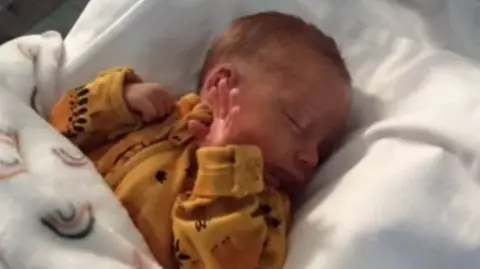In a tragic and distressing case that has caught the attention of the public and media alike, a father has been convicted of murdering his premature baby, Brendon Staddon, who was just two weeks old when he suffered fatal injuries while under medical care at Yeovil District Hospital. The infant, born prematurely at 33 weeks, sustained multiple grievous injuries, including a fractured skull, a broken neck, a broken jaw, and fractures in both legs. These injuries were documented on March 5, 2024, within the neonatal ward of the hospital.
The accused, Daniel Gunter, 27, with no fixed address, denied any wrongdoing in relation to his son’s death. However, after the proceedings at Bristol Crown Court, he was found guilty of murder. Sentencing for Gunter is scheduled for October 3rd. In contrast, his partner, 26-year-old Sophie Staddon, has been acquitted of a lesser charge related to causing or allowing the death of a child, meaning she is free to go following the jury’s decision.
The jury’s deliberation, as recounted during the trial, was marked by emotional responses, particularly from one female juror who became visibly upset upon hearing the verdict. In stark contrast, both Gunter and Staddon displayed no emotional response when the jury’s decision was delivered. The judge, after remanding Gunter into custody, emphasized the severity of his actions, indicating that there would be serious ramifications for his conviction.
During the trial, it was revealed that the nursing staff at the hospital had significant concerns regarding Gunter’s treatment of Brendon. Witness testimony indicated that Gunter had exhibited aggressive and rough behavior toward his infant son, raising alarm among hospital personnel. Medical experts testified that Brendon’s injuries were consistent with episodes of severe abuse, including being swung against hard surfaces, suggesting a pattern of violence and disregard for the baby’s wellbeing.
Ch Insp Nadine Partridge, who led the major crime investigations team from Avon and Somerset Police, described the investigation as one of the most challenging in her two-decade career. She characterized Gunter’s actions as “evil” and expressed the profound distress experienced by investigators in viewing the extent of Brendon’s injuries. The injuries, according to her, were unprecedented in their severity, affecting every part of the baby’s tiny body.
The trial disclosed a worrying dynamic between Gunter and Staddon. Witness accounts suggested that Gunter was controlling toward Staddon, causing concern among nursing staff about her autonomy and ability to care for the child independently. Their relationship raised red flags, particularly when Gunter was seen reacting aggressively while changing Brendon’s diaper. Following a worrying observation that the couple had left the hospital for a few days and only returned on March 4, concerns grew about the circumstances leading up to Brendon’s death.
On March 5, at around 04:00 GMT, Staddon alerted the nursing staff that Brendon was “cold,” prompting immediate medical assistance. Tragically, initial attempts to resuscitate the baby indicated he had likely been deceased for at least half an hour prior to the alarm being raised. The situation went from bad to worse as Gunter reportedly prioritized smoking outside over seeking immediate help for their child’s condition.
Significantly, both Gunter and Staddon opted not to take the stand during the trial, relinquishing their opportunity to present their account of events to the jury. Ch Insp Partridge noted that Gunter seemed more preoccupied with his personal belongings, such as his phone and vaping device, rather than demonstrating concern for Brendon’s wellbeing. This lack of remorse was a stark theme throughout the case.
Following the jury’s verdict, a spokesperson for the Somerset NHS Foundation Trust conveyed the distress caused by the case. The trust confirmed its participation in the Child Safeguarding Practice Review, aimed at thoroughly examining the circumstances surrounding Brendon’s tragic death. This comprehensive review is underway and is expected to provide insights into potential failures within the system, with a report due for release in autumn 2025.
This heartbreaking case serves as a grim reminder of the complexities and vulnerabilities that surround neonatal care and child safety. The loss of such a young life under violent circumstances invites reflection on the systems in place that are supposed to safeguard our most vulnerable citizens.












